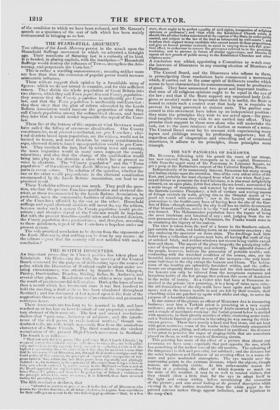THE scowl DISSENTERS.
AN important proceeding in Church politics has taken place at Edinburgh. On Wednesday the linh, tlIV meeting of the Central Board, convened for the purpose of deliberating upon the course of policy which the Diseenters of Scotland ought to adopt under ex- isting circumstances, was attended by deputies from Glasgow, Paisley, Dunt'ertnline, Datelee, Stirling, Kelso, St. Andrew's, and
several other places. Resolutions and an address were agreed to, the result of previous careful deliherat ion. During the lapse of more than a month which has intervened since it was first resolved to hold the meeting, a droll inhiross lma been circulated throughout Scotland ; awl the document at last nerced upon is the fruit of the suggestions thrown out in the coin •;c 0:' an extensive and protracted correspondence. These documents are too long to he inserted in full, and have reached us at too late an hour to admit ()I' our preparing a satiafac- tory abstract of their coot s !its 'file first and second resolutions
declare that " patrenage, tru,ion of ministers, and the interfe- rence of the ci■ ii pisser 'HI et elvAustieal niattera though un-
doubted evils, arc evil; which uccessarily flow from the anomalous character of a State Church. The third condemns the virulent sectarianism of the present High Church movement in Scotland. fburth is as follows-
" That not only did this party, [the Fa High Church Liberals.] by means or a 'Win., ii c: ‘signli th■ y bY.11 coy alp; 1.11t ::chnling eitiz:-11 of the higite,t i Teoahility fro::; th,. T.im-t ILucity, for no tIer 1"1•11A,11 than that lie sae, a em. i.o.nt pis:ester, hut, through tie-It restle iotrigue.; and the timid policy of rnm..nt, t he 10i:wild,: u,t equal right: iricspective a reli- gious within the la,t three yepr, been reratedly.and glaringly violated: a, tiur instance, lu the xelu.io:, Disqmters from tieing teadiers itm forty itew mcho,r1, oe.aPyjum tht. Highland l—from a seat at tile Board :Ippointed ihr ,,,utip•ritit,litling the prioting of the ::etipture4—from being :ted, fr,o the I trioector,hip of Schooht • violations of the priocip!e ref,ra I t,o, more numertm-, it is believed, Om have occurred during the preceding cell toy.'' The fifth re.o!utin declares, that
. . " situated ie; matters at pi esLat are, it is the duty of all Dissenters who possess the elLctive franchise, in all iuture elections, to require from candidates for their suffrages an assent to the two following propositions—' that, in a free
state, there ought to be perfect equality of civil rights, irrespective of religious opinions or profession'; and 'that while the Established Church exists, it should, like all other bodies maintained at the expense or the State, be under public control, and subject to the law of the land as interpreted by civil courts '; and to refuse their support to any candidate who cannot assent to these propositions, and give an honest promise zealously to assist in carying them into full prae- tkal effect, to endeavour to remove the grievances referred to in the preceding resolution, and to prevent in future all similar aggressions; and likewise to oppose all new grants of public money to the Established Churches and other religious sects."
A resolution was added, appointing a Committee to watch over the interests of Dissenters in any ensuing election of Members of Parliament.
The Central Board, and the Dissenters who adhere to them, in promulgating these resolutions have commenced a movement which, if carried out in the same spirit of deliberate resolve which seems to have characterized its commencement, must be productive of good. They have announced two great and important truths— that men of all religious opinions ought to be equal in the eye of the law ; and that if the State support any organized body (reli- gious or secular) under an impression that it is useful, the State is bound to retain such a control over that body as is requisite to prevent its being perverted to sinister ends. The parties con- cerned in this movement have taken up an independent position : they state the principles they wish to see acted upon— the prac- tical tangible reforms they wish to ace carried into effect. fhey promise their support to those men alone who will undertake the task, not to the mere retainers of a faction or wearers of a name. The Central Board must lay its account with experiencing many lapses and yieldings among its professing supporters ; but if, regardless alike of vituperation and wheedling and of occasional desertions, it adhere to its principles, those principles must triumph.


























 Previous page
Previous page